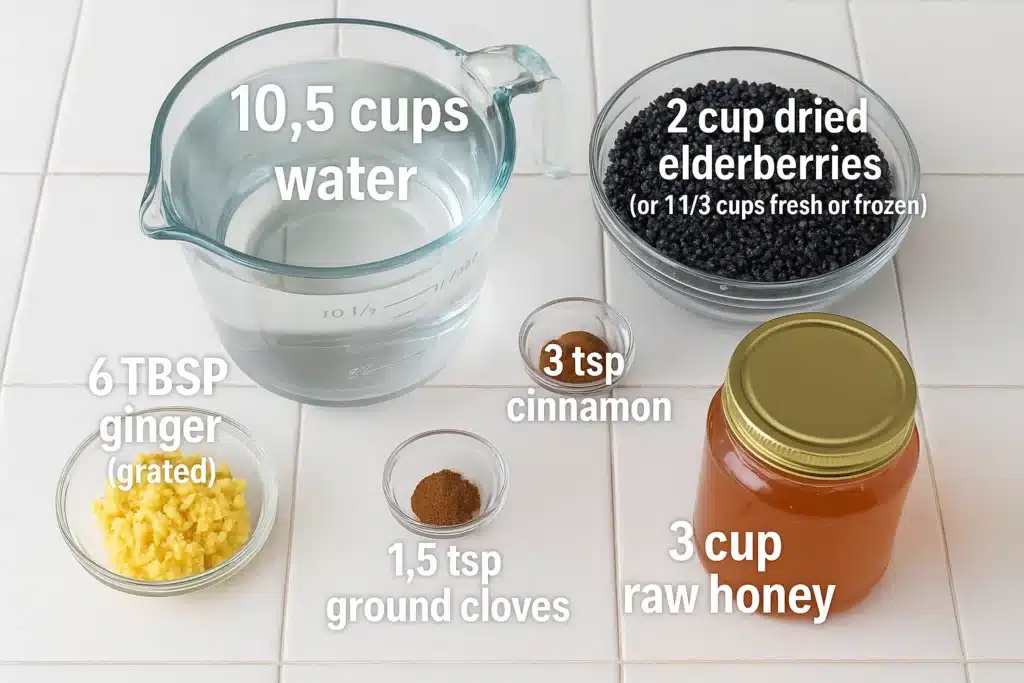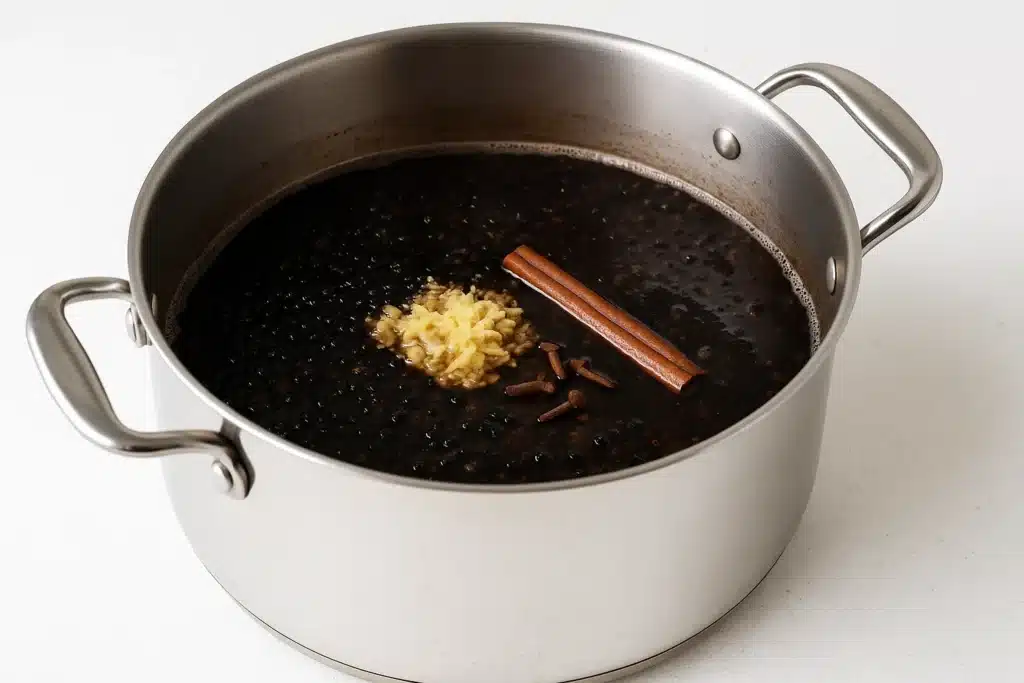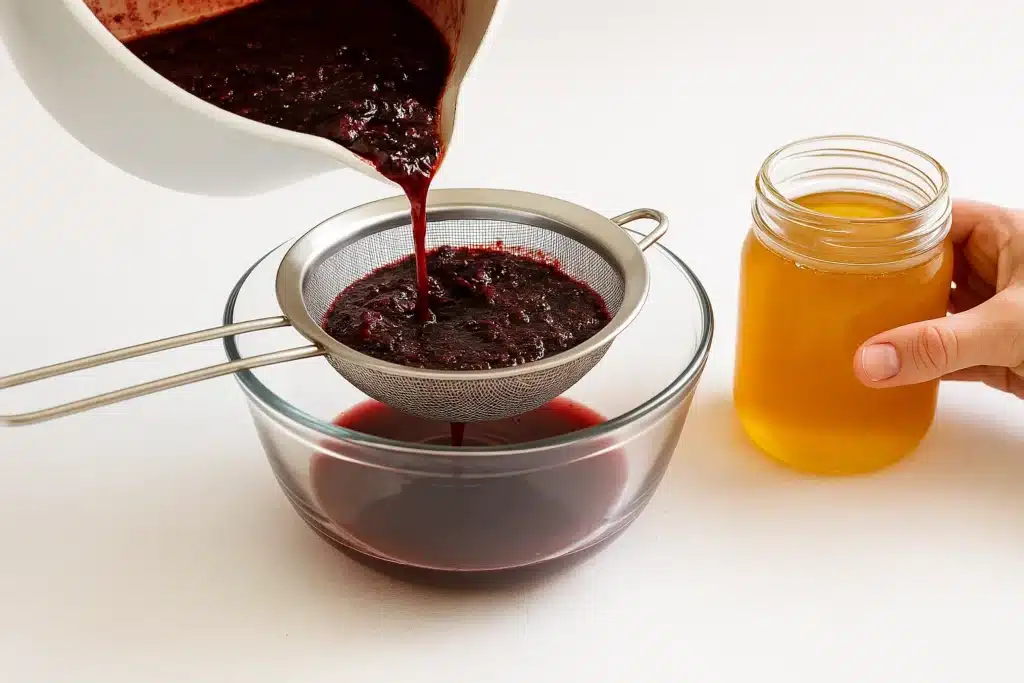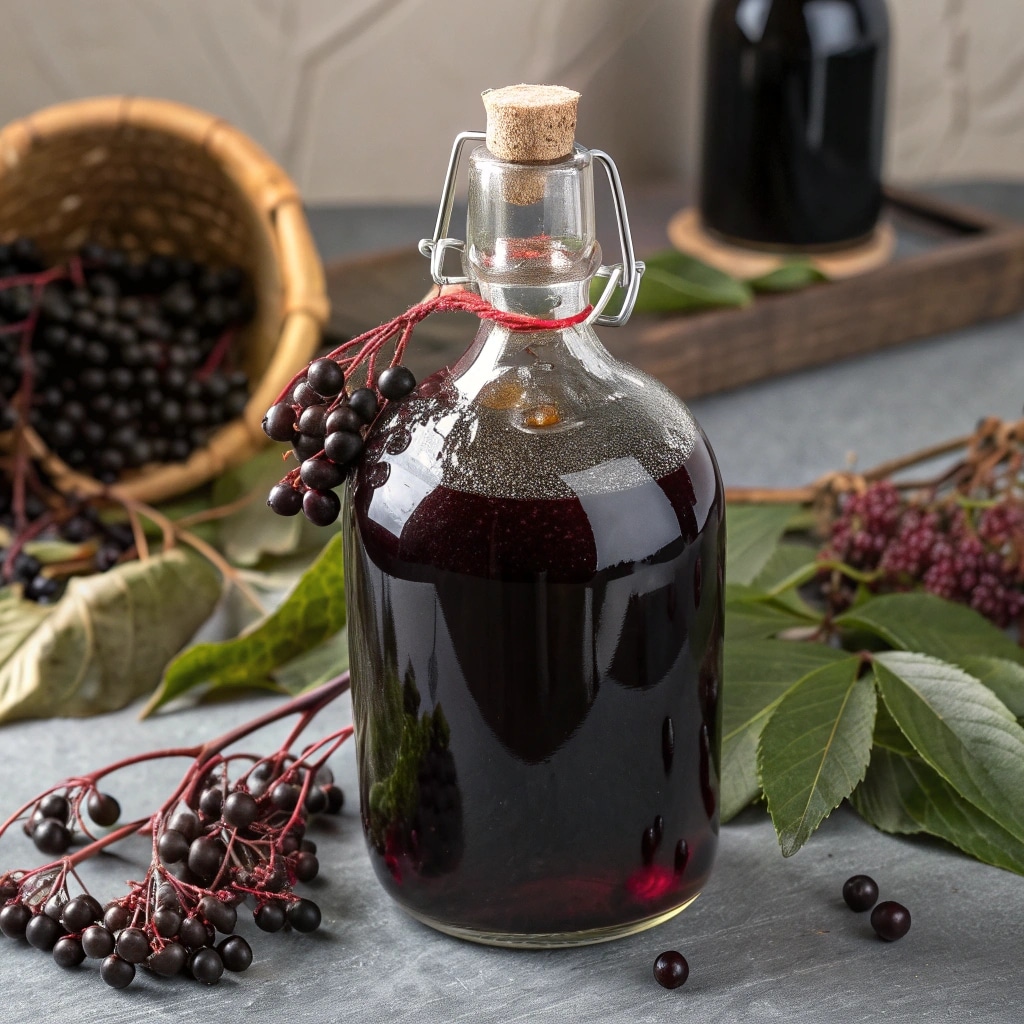Looking for a simple and effective way to support your immune system year-round? This elderberry syrup recipe delivers just that—using clean, wholesome ingredients you can pronounce. Whether you’re gearing up for cold and flu season or simply want a delicious daily wellness boost, this syrup is both flavorful and functional.
Unlike store-bought versions loaded with additives or refined sugars, this homemade elderberry syrup offers a rich, comforting taste with a perfect balance of spice and sweetness. Plus, it’s incredibly easy to make and customize.
Table of Contents
Table of Contents
Why You’ll Love This Recipe
- Quick & Easy – From stovetop to jar in under an hour.
- Simple Ingredients – All-natural, no preservatives, just goodness.
- Rich, Warming Flavor – Perfectly spiced with ginger and cloves.
- Great for the Whole Family – A spoonful a day keeps the sniffles away.
- Cost-Effective – Much cheaper than buying pre-made bottles.
Unlike many recipes out there, this one emphasizes a strong spice profile that complements the deep berry notes. It’s satisfying, comforting, and seriously potent—an elderberry syrup recipe that’s as delicious as it is functional.
Ingredients Needed

Let’s break down what you’ll need to whip up this powerful syrup. Everything here is pantry-friendly, clean, and easy to source.
For the Elderberry Base:
- 10½ cups filtered water – Cold or room temperature.
- 2 cups dried elderberries – Or substitute with 1⅓ cups fresh or frozen.
- 6 tablespoons freshly grated ginger – Don’t skip, it adds immune-boosting warmth.
- 3 teaspoons ground cinnamon – Adds depth and balance to the sweetness.
- 1½ teaspoons ground cloves – Strong and aromatic, enhances shelf life naturally.
For Sweetening:
- 3 cups raw honey – Choose local or organic honey for added immune benefits.
Tip: Don’t add the honey while the syrup is hot—it kills the beneficial enzymes. Wait until it cools to lukewarm before mixing it in.
How to Make Elderberry Syrup Recipe
This method is designed to maximize flavor and potency while keeping things beginner-friendly. Here’s how to make it:
Step 1: Combine and Simmer

Pour 10½ cups of water into a large saucepan. Add in elderberries, grated ginger, cinnamon, and cloves.
Bring the mixture to a rolling boil over medium-high heat. Once it boils, reduce to a simmer and let it cook uncovered for 30–40 minutes, or until the liquid reduces by half.
Why it matters: Simmering helps extract the medicinal compounds from the berries and spices.
Step 2: Cool and Mash
Turn off the heat and let the mixture sit until it’s warm—not hot. Then, gently mash the berries against the side of the pot using the back of a spoon or a flat utensil.
Tip: Mashing helps release the remaining juices for maximum flavor and nutrients.
Step 3: Strain and Sweeten

Place a fine mesh strainer or cheesecloth over a bowl or jar. Carefully pour the mixture through to separate the liquid from the pulp.
Once the strained syrup reaches lukewarm temperature, stir in the 3 cups of raw honey until fully dissolved.
Step 4: Bottle and Store
Transfer your finished elderberry syrup into a clean glass mason jar or bottle. Seal tightly and refrigerate for up to 2 months. Shake gently before each use.

Serving and Storage Tips
Serving Suggestions
- Take 1 tablespoon daily for adults and 1 teaspoon daily for children.
- Stir it into tea, sparkling water, or even drizzle over pancakes or oatmeal.
- Use as a base for wellness shots with lemon and cayenne.
Storage
- Store in an airtight glass container in the fridge.
- Keeps well for up to 2 months thanks to the honey’s natural preservation.
- Avoid freezing, as it may affect the texture and potency.
Helpful Notes
- Prefer vegan? Swap honey for organic maple syrup—but note this shortens shelf life.
- Want stronger flavor? Add orange peel or star anise during simmering.
- Using fresh berries? Make sure they’re fully ripe and cooked—raw elderberries can be toxic.
- No cheesecloth? Use a clean t-shirt or nut milk bag to strain.
- Extra kick? Add a pinch of cayenne during the simmer phase.
Learn more about Banana Peanut Butter Protein Smoothie that complement elderberry syrup.
Conclusion
This elderberry syrup recipe isn’t just another trendy health hack—it’s a time-tested, delicious, and effective way to boost your immunity and support your family’s health naturally.
From its warm, comforting spices to its powerful antioxidant properties, this syrup is a daily ritual worth starting.
Tried this recipe? Let us know in the comments below and leave a star rating!
Don’t forget to pin or share with your wellness-loving friends on Pinterest and Facebook.
Question for you: Have you tried any fun variations? Maybe citrus zest or herbal add-ins? Tell us what worked for you!
Frequently Asked Questions (FAQ)
How do you make elderberry syrup?
Start by simmering dried or fresh elderberries with spices and water until the mixture reduces by half. Then, strain the mixture, let it cool, and stir in raw honey before bottling it.
What do you mix elderberry syrup with?
You can mix it with warm teas, sparkling water, smoothies, or yogurt. It also works as a sweet topping for pancakes or granola bowls.
Is it safe to make your own elderberry syrup?
Yes, absolutely—provided you cook the berries thoroughly. Raw elderberries contain compounds that can be harmful if not cooked, but this recipe ensures complete safety.
What not to mix with elderberry?
Avoid combining elderberry syrup with alcohol or highly processed supplements unless advised by a healthcare provider. Never eat raw elderberries or leaves—they’re toxic when uncooked.

Homemade Elderberry Syrup
Ingredients
Method
- Pour 10½ cups of water into a large saucepan. Add elderberries, grated ginger, cinnamon, and cloves.
- Bring to a rolling boil over medium-high heat. Reduce to a simmer and cook uncovered for 30–40 minutes, or until liquid is reduced by half.
- Turn off the heat and let the mixture cool until warm. Gently mash the berries against the side of the pot with the back of a spoon or flat utensil.
- Strain the mixture through a fine mesh strainer or cheesecloth into a bowl or jar.
- Once the liquid is lukewarm, stir in the raw honey until fully dissolved.
- Transfer the syrup into a clean glass mason jar or bottle. Seal tightly and refrigerate. Shake before each use.
